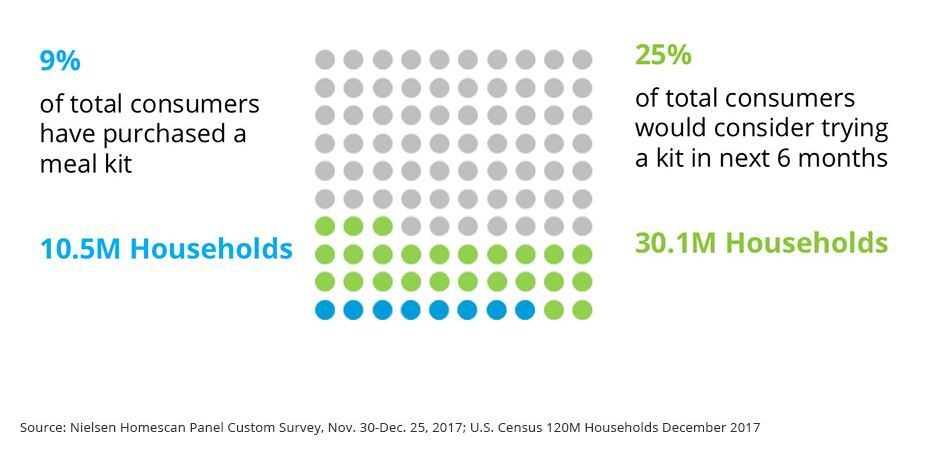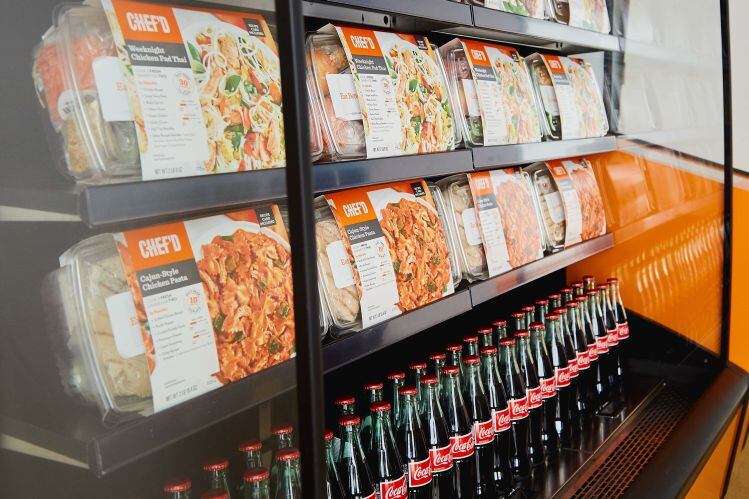"Contrary to popular speculation, Chef'd's announcement is not a sign of an industry in demise," Sean Butler, who led the retail business unit for Chef’d until May 2018, penned in an article on LinkedIn yesterday.
Butler referenced Nielsen data showing meal kits as the fastest growing food channel in the US (including grocery as well as food service and delivery).
According to Nielsen data, meal kits grew three times faster than any other food channel with total sales last year of $2.2bn. In addition, there is a massive untapped audience for meal kits as Nielsen found that 9% of consumers have tried a meal kit and one-fourth of the US population would consider buying a meal kit.

“Hello Fresh, Blue Apron, Home Chef, Sun Basket and other brands are all achieving sustained profitability or are on track to do so this year,” Butler penned.
“This is despite widespread media and pundit anxiety about high customer acquisition costs. Are these profitable companies doomed? Come on.”
Unsustainable business model?
Butler added that in-store retail meal kit offerings such as products sold by Blue Apron in Costco and Home Chef’s rollout to Kroger stores are what’s driving revenue in the space.
In a March 2018 interview, Butler told FoodNavigator-USA that based on IRI data Chef’d was leading the meal kit category by dollar and unit velocity as

well as total units and total dollars.
If Chef’d was also active in the promising physical retail with a goal of reaching 1,500 stores by this past May, where did the company go wrong?
One reason could be that it was overextending itself, Butler indicated.
Unlike its competitors, Chef’d does not require a subscription and gives customers an a la carte shopping option for its hundreds of products to build more than a thousand different recipes. The company also offers reoccurring weekly meal plans for two or four people.
Over the past three years, Chef’d had built a supply chain infrastructure which included three production facilities to support its hundreds of recipe options that it could ship to consumers within the same day (most other companies shipped within a few days or the following week).
Its infrastructure model was also supported by financial investment from the industry including a $10m cash injection from Campbell Soup last year.
However, that type of on-demand delivery for custom meals was unsustainable, according to Butler.
“Meal kit supply chains are very difficult relative to other CPG products. Most products have few perishable ingredients. Each meal kit has five to ten highly perishable ingredients. In a dynamic manufacturing supply chain, it's much harder to manage chicken, lettuce and fish than the ingredients to a gluten-free bar,” Butler said.
“The right way to do meal kits is not the subscription model, and Chef'd offered far too many meals to achieve sustainability.The future is a curated non-subscription e-commerce model supported by a fresh, rotating set of in-store offerings.”
Terra’s Kitchen: ‘We’ve built our business differently’
Other players in the space such as CEO of Terra's Kitchen Michael McDevitt are staunch believers that the meal kit space has a place in American shoppers' lifestyle habits.
“I found the most intriguing aspect of the recent news of Chef’d shutting down was that their revenue numbers were showing strong year over year growth in their business. This, along with the growth of other players in the industry, clearly shows the continued growing consumer demand for fresh food delivered directly to our doors," McDevitt told FoodNavigator-USA.
Baltimore-based Terra’s Kitchen, which launched in 2015 on the west coast and in 2016 on the east coast, said that its approach has been different compared to its competitors that spend large sums of cash to create entirely new systems of infrastructure.
“Most meal kit companies do everything themselves from scratch, so they’re buying massive warehouses, hiring all these employees, forecasting, buying food to order, so they are having to raise a lot of money,” Terra’s Kitchen CEO Michael McDevitt previously told FoodNavigator-USA.
Terra’s Kitchen utilized existing food suppliers and parts of their facilities to prepare its meal kits and using the supplier’s food inventory.
“We've built our meal kit business differently than Chef’d and other competitors. Rather than building our own version of Chef’d or Blue Apron’s infrastructures, we simply leveraged infrastructure from an established food distribution partner and tweaked their model to ship direct to consumers’ homes,” Terra's Kitchen said in an emailed statement.
Real winners to emerge
McDevitt strongly believes that the meal kit space has a place in the modern shopping experience of the American consumer and the Chef'd news is not indicative of the health of the entire industry.
“I found the most intriguing aspect of the recent news of Chef’d shutting down was that their revenue numbers were showing strong year over year growth in their business," McDevitt told FoodNavigator-USA.
"This, along with the growth of other players in the industry, clearly shows the continued growing consumer demand for fresh food delivered directly to our doors."
McDevitt acknowledges this it is a tough and complex category to succeed in, however.
"I found the most confirming aspect of the recent news to be that, the expertise and infrastructure to efficiently execute on delivering fresh food to the door is complex and with small margin for error... the 'winners' will be those with the combined expertise and deep experience in consumer behavior and fresh food infrastructure.”
